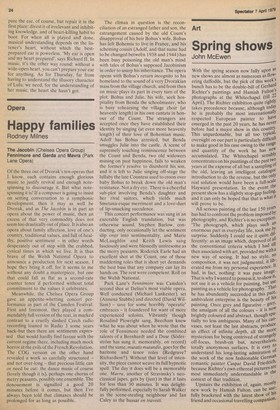Happy families
Rodney Milnes
The Jacobin (Chelsea Opera Group) Fennimore and Gorda and Mavra (Park Lane Opera) Of the three out of Dvorak's ten operas that I know, each contains enough glorious music to justify revival and enough notespinning to discourage it. But what notespinning it is! If a composer is going to insist on setting conversation to a symphonic development, then it may as well be Dvorak, and as The Jacobin is in part an opera about the power of music, then an excess of that very commodity does not seem too drastically out of place. It is also an opera about family affection, love of one's country, traditional values, and full of healthy, positive sentiment — in other words desperately out of step with the crabbed, cynical times in which we live. It is thus brave of the Welsh National Opera to announce a production for next season. I hope they bring it off, for it seems to me without any doubt a masterpiece, but one that could fall as flat as a second-rate counter tenor if performed without total commitment to the values it celebrates.
Meanwhile, the Chelsea Opera Group gave an appetite-whetting concert performance as part of the Camden Festival. First and foremost, they played a commendably full version of the text, in marked contrast to a cruelly slashed Czech radio recording loaned to Radio 3 some years back—but then there are sentiments expressed that would hardly find favour with the current regime there, including much mock horror at the evils of the French Revolution. The COG version on the other hand revealed a work so carefully structured — and not over-long — that precious little can or need be cut: the dance music of course (lovely though it is), perhaps one chorus of merry peasants. possibly one ensemble. The denouement is signalled a good 20 minutes before it comes, but then I've always been told that climaxes should be prolonged for as long as possible. The climax in question is the reconciliation of an estranged father and son, the estrangement caused by the old Count's disapproval of his heir Bohus's wife. Bohus has left Bohemia to live in France, and his scheming cousin (Adolf, and that name had to be changed between 1938 and 1944) has been busy poisoning the old man's mind with tales of Bohus's supposed Jacobinism in order to usurp his inheritance. The opera opens with Bohus's return incognito to his homeland to the sound of a very Dvorakian mass from the village church, and from then on music plays its part in every turn of the plot. Bohus and Julie, his wife, seek hospitality from Benda the schoolmaster, who is busy rehearsing the village choir (at heavenly length) in his own cantata in honour of the Count. The strangers are accepted once they have established their identity by singing (at even more heavenly length) of their love of Bohemian music. Adolf has Bohus arrested, but Benda smuggles Julie into the castle. A scene of supremely touching reminiscence between the Count and Benda, two old widowers musing on past happiness, fails to weaken the former's resolve to disinherit his son, and it is left to Julie singing off-stage the lullaby the late Countess used to croon over baby Bohus to break down the old man's resistance. Not a dry eye. There is a cheerful sub-plot involving Benda's daughter and her rival suitors, which yields much Smetana-esque merriment and a love-duet of lip-smacking succulence.
This concert performance was sung in an execrable English translation, but was otherwise sound. Stephen Barlow, conducting, only occasionally let the sentiment slip over into sentimentality, and Marie McLaughlin and Keith Lewis sang lusciously and were blessedly untiresome as the merry peasants. Roderick Earle had an excellent shot at the Count, one of those maddening roles that is short yet demands the best bass that any company can lay its hands on. The rest were competent. Roll on the Welsh National.
Park Lane's Fennimore was Camden's second shot at Delius's most viable opera. Well conducted (Michael Lankester), set (Annena Stubbs) and directed (David William) — save for some horribly 'operatic' embraces — it foundered for want of more experienced soloists. Vibrantly though Rosalind Plowright sang, Beecham knew what he was about when he wrote that the role of Fennimore needed the combined talents of a Bernhardt and a Duse (Soderstrom has sung it. memorably, on record) and the same, mutatismutandis, goes for the baritone and tenor roles (Redgrave? Richardson?). Without that level of intensity, the piece cannot weave its full hypnotic spell. The day it does will be a memorable one. Mavra, another of Stravinsky's neoclassical japes, gets by (just) in that it lasts for less than 30 minutes. It was delightfully performed, especially by Sarah Walker as the scene-stealing neighbour and Ian Caley as the hussar en travesti.


































 Previous page
Previous page